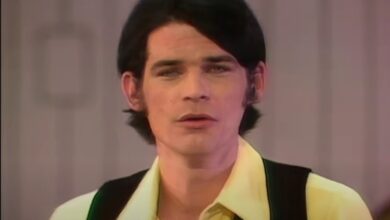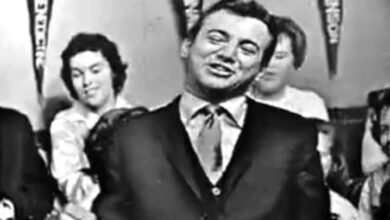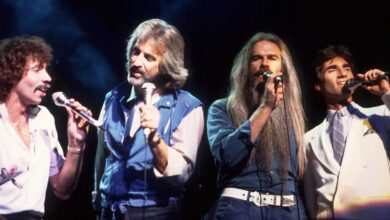Elvis Presley Delivered A Timeless Rendition Of “Can’t Help Falling In Love”
In the annals of music history, few songs have achieved the enduring allure of Elvis Presley’s “Can’t Help Falling in Love.” Released in 1961 as part of the “Blue Hawaii” soundtrack, this ballad not only showcased Presley’s vocal depth but also cemented its place as a timeless classic. Its journey from a movie soundtrack to a global anthem is a testament to its universal appeal and the magnetic charm of its performer.
The origins of “Can’t Help Falling in Love” are as captivating as the song itself. The melody draws inspiration from “Plaisir d’amour,” an 18th-century French love song composed by Jean-Paul-Égide Martini. This connection to a centuries-old tune adds a layer of historical depth, bridging classical compositions with mid-20th-century pop culture. The songwriters—Hugo Peretti, Luigi Creatore, and George David Weiss—crafted lyrics that resonated with the themes of inevitable love, perfectly aligning with Presley’s emotive delivery.
Elvis Presley, by 1961, was already a household name, having revolutionized the music scene with his unique blend of rock and roll, blues, and country. His foray into Hollywood had begun, and “Blue Hawaii” was among the films that showcased his versatility as both a singer and actor. The inclusion of “Can’t Help Falling in Love” in the movie not only enriched its narrative but also provided Presley with a platform to deliver one of his most memorable performances.
Upon its release, “Can’t Help Falling in Love” captivated audiences worldwide. In the United States, the song ascended to the No. 2 spot on the Billboard Hot 100 chart, demonstrating its widespread popularity. In the United Kingdom, it achieved even greater success, topping the UK Singles Chart for four weeks in 1962. These chart accomplishments underscored the song’s universal appeal and solidified its status as one of Presley’s most significant hits.
The song’s impact on the music industry was profound. It became a staple in Presley’s live performances, often serving as the closing number in his concerts. Notably, during his 1968 NBC television special, commonly referred to as the “’68 Comeback Special,” Presley delivered a rendition of the song that remains iconic. This performance marked his return to live music after years dedicated to filmmaking, reestablishing his presence in the music world.
Beyond its initial success, “Can’t Help Falling in Love” exhibited remarkable staying power. The song’s timeless melody and heartfelt lyrics have inspired numerous artists across genres to offer their renditions. In 1993, British reggae band UB40 released their version, which soared to the top of the Billboard Hot 100, introducing the classic to a new generation and exemplifying its adaptability across musical styles.
The song’s influence extended into popular culture, featuring in various films and television shows. Its inclusion in movies like “Lilo & Stitch” and “Crazy Rich Asians” introduced the ballad to younger audiences, ensuring its continued relevance. The song’s association with romantic moments in cinema further cemented its status as an anthem of love and devotion.
Elvis Presley’s career, marked by a series of highs and lows, found a consistent anchor in “Can’t Help Falling in Love.” Even during periods when his popularity faced challenges, the song remained a beloved part of his repertoire. Its enduring appeal provided a touchstone for fans and a reminder of Presley’s unparalleled ability to convey deep emotion through his music.
The song’s legacy is also evident in its commercial success over the decades. It has been certified Platinum by the Recording Industry Association of America, signifying over one million units sold. This commercial achievement reflects its enduring popularity and the deep connection it has fostered with listeners across generations.
In live performances, “Can’t Help Falling in Love” often held a place of honor. Elvis frequently used it as the finale for his concerts, a tradition that began in the late 1960s and continued until his final performance in 1977. This consistent inclusion underscores the song’s significance to Presley and its resonance with audiences, serving as a poignant conclusion to his shows.
The song’s adaptability is further highlighted by its numerous covers by artists from various genres. From Andrea Bocelli’s operatic rendition to Twenty One Pilots’ contemporary take, “Can’t Help Falling in Love” has transcended musical boundaries. Each interpretation offers a fresh perspective while honoring the original’s emotive core, demonstrating the song’s versatility and enduring appeal.
In reflecting on “Can’t Help Falling in Love,” it’s evident that its magic lies in its simplicity and sincerity. The straightforward yet profound lyrics, combined with a melody that evokes deep emotion, create a timeless piece that continues to touch hearts. Elvis Presley’s delivery imbues the song with a sense of authenticity, making listeners believe in the inevitability of love.
As we consider the song’s place in music history, it’s clear that “Can’t Help Falling in Love” stands as a testament to the enduring power of a well-crafted ballad. Its journey from a movie soundtrack to a global standard illustrates the profound impact a single song can have. Decades after its release, it remains a beloved piece, continuing to be discovered and cherished by new generations.
In conclusion, “Can’t Help Falling in Love” is more than just a song; it’s a cultural touchstone that encapsulates the essence of love and the timeless appeal of Elvis Presley. Its enduring popularity serves as a reminder of the power of music to transcend time and connect with the deepest parts of the human experience. As long as there are hearts capable of love, this classic will continue to resonate, affirming its place in the pantheon of great musical works.



